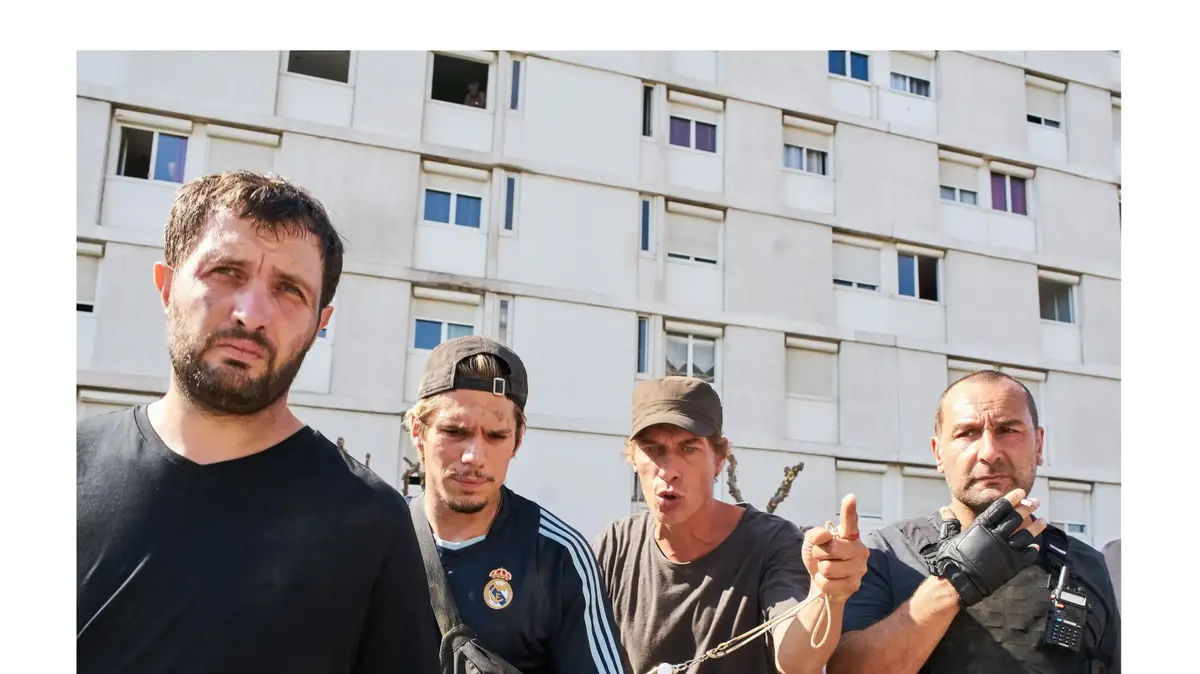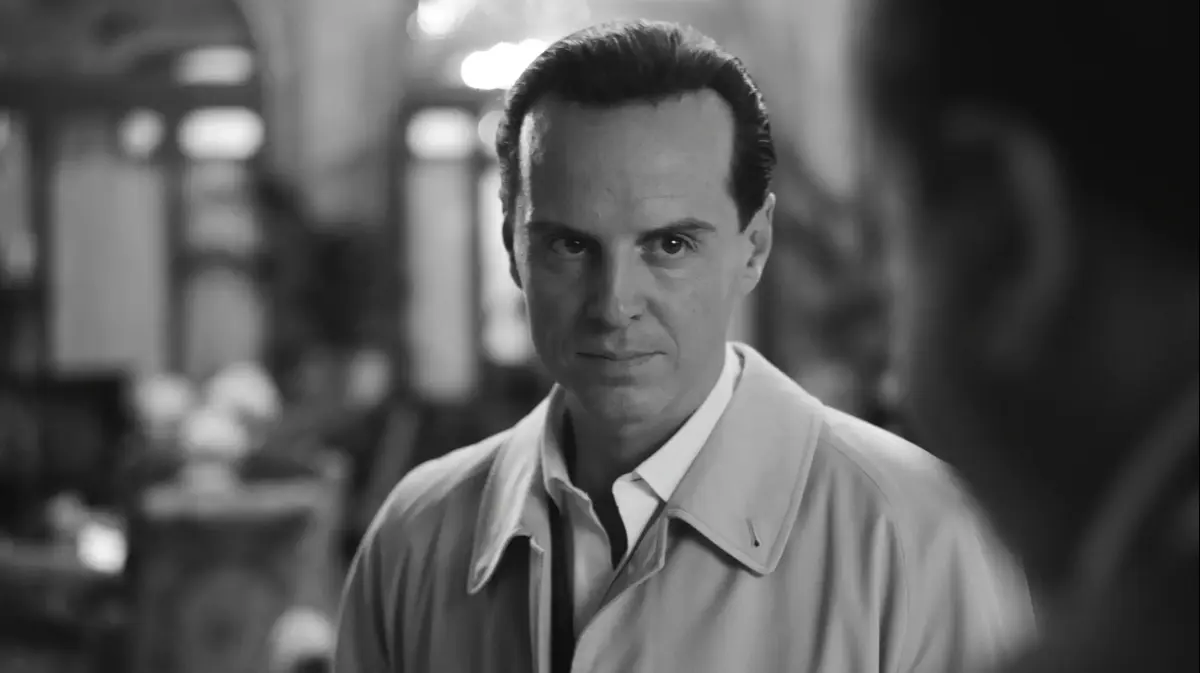culture
Theater
Movie review
The big scandal behind the new movie on Netflix
After smashing the box office in France and upsetting the country's network, media and political system, "Marseille's Crime Streets" hit Netflix in Israel (and the rest of the world).
Watching the film reveals that the scandal around him is more interesting than the work itself
Tags
Marseille
Netflix
Avner Shavit
Monday, 20 September 2021, 00:37 Updated: 01:43
Share on Facebook
Share on WhatsApp
Share on general
Share on general
Share on Twitter
Share on Email
0 comments
From "Cry Macho"
Jacko Eisenberg fired from "Big Brother"
Karin and Itamar
"Morning Show" Season 2, Jennifer Aniston, Reese ...
A winning horse
Nathan Goshen sings "It's Ours" at the reception of ...
Rebecca Marder
Prime Minister Bennett in an interview with Walla: Barel Hadaria Shmueli did not ...
Only Murders in the Building, ...
Get out of this, Adi Ashkenazi, Avi Nussbaum
The double life of Veronica
Pictures from Marriage, Oscar Isaac, Jessica Chastain
Trailer for the movie "Crime Streets of Marseille" (Cannes Film Festival)
(Photo: image processing, Shai Librovsky)
This past weekend, a French crime thriller called "Marseille's Crime Streets" appeared here on Netflix - a film that broke box office hits in its homeland, but came directly to the streaming service in the rest of the world. The generic Hebrew name given to it, as well as the fact that it does not receive special public relations here, may give the impression that it is another ordinary product that fills shelves. In fact, it is a cultural phenomenon that has become the talk of the day in France, and excites not only the film sections but also the network, the political system and virtually every public arena.
Originally, the film was called "Bac Nord", after the bridge that operated in the most problematic areas of Marseille, one of the most sensitive cities in France. It is based on events that took place in reality, and describes how police used almost every possible means to fight the cartels that are raging in the place. Thus, for example, as described here, law enforcement officers used drugs they seized to pay them to informants, who in return provided valuable information about the criminal organizations.
Initially, the brigade members were given flowers and champagne thanks to their operations and arrests.
But in the end, when the controversial practices were discovered, they became the defendants themselves.
Did they really cross the border, or did they have no choice, because that was the only way to fight the crime empire that got out of control, and the real culprits are the authorities who let the situation deteriorate like this?
At least according to the film, the answer is clear, because it completely sticks to the point of view of the cops and sticks to their versions.
The film's release in France was postponed because of the corona.
It ended up on the most timely and unfortunate timing possible - last summer, when crime figures in Marseilles broke new records, bodies piled up in the streets like flies, and President Macron came to visit her in an emergency to announce a national five-year plan to eradicate violence in the city.
More on Walla!
One Hundred Movies to Watch on Netflix: The Complete Guide
To the full article
And yes, Adele Xercopoulos is here too.
From "Crime Streets of Marseille" (Photo: Cannes Film Festival)
The star of the film, Jill Lalouche, defined it as a modern western. Indeed, the "Crime Streets of Marseille" depict the city in which it is named as the Wild West. The cops who disgrace themselves in the extraterritorial territory are the cowboys, and on the other side are the rioters, whom the crime thriller presents as human animals. Most of them stand in front of the camera half-naked, usually with masks and without names, and most of you are also immigrants or sons of immigrants, and Muslims. During one of the key moments, the police informant notes that the crime barons tend to chaperone the neighborhood children in Eid al-Fitr, but beyond that they have no human sentiment.
The premiere of the crime thriller took place about two months ago at the last Cannes Film Festival, and immediately after that the political discourse around it began. At the official press conference after its premiere, one of the journalists announced - "Watching the film makes me want to vote for Le Pen." The actors and the director responded with an embarrassed laugh, which was interpreted as contempt.
If that's not enough, then Marin Le Pen herself was quick to take a ride on the film, tweeting - "While the president is doing a media show in Marseille, this film reflects reality! Go watch it! That way you will understand how serious the situation is and how urgent it is to deal with."
More on Walla!
"I do not understand how it is that they do not murder Le Pen"
To the full article
French Twitter erupted in noise.
Cedric Jimenez (center), director of "Crime Streets of Marseille", with the stars of the film in the filming (Photo: Cannes Film Festival)
Indeed, the French and French women accepted the recommendation, and the film became one of the only box office hits of the Corona days. The men and women of the left who watched him enjoyed less, and attacked him for the way he presents the same reality and the same situation.
Director Cedric Jimenez, originally a resident of Marseille, came out to defend himself against all these accusations and enlisted the help of a host of honesty advocates. It is too short to summarize the further discussion that has developed around his work, and contains many of the issues that have troubled France in recent years. The film itself, and the discourse on it, also illustrate that the European state can give the United States a beautiful battle in terms of the degree of purity and righteousness it has, and on the other hand the innocence and populism that floods it.
Jimenez may not be a Le Pen campaigner, but he and his followers are naive in their outright defense of the film.
The world is now celebrating sixty years since the release of "Rashomon", which taught us that there is always more than one truth.
Here, however, there is no room for questions.
The members of the brigade are a sign and a model.
Their commanders - painted bastards.
The suburbs are savages at worst, and weak victims at best, used as playthings and exploited by police until they can be thrown to their bitter fate
More on Walla!
"My whole body is full of injuries from rubber bullets"
To the full article
The opposite of a record.
From "Crime Streets of Marseille" (Photo: Cannes Film Festival)
The exemplary "Poor Life" came out two years ago and taught us how to deal with a complex issue properly, and present cops in a rough, ambivalent and multi-layered way. "The Crime Streets of Marseille", on the other hand, is licked like creme brulee.
The screenwriter-director pretends to be realism, but for the role of the lead cop he chose Jill Lalouche, perhaps the most sympathetic and empathetic actor in France, and not exactly a required casting for a character who is supposed to be rough. Beside him, as another tough lawman from the suburbs of Marseilles, stars Francois Sybil of Paris, best known for his baby face, and the blonde mane of hair he was blessed with.
It's quite clear that Jimenez cast these actors to make the audience fall in love with the cops, which is legitimate - but he can not pretend to slap France's face the truth about Marseille when he does so with a creamy boy from Paris.
Beyond the content, there is also a problem with the style.
Jimenez, according to him and his defense attorneys, seeks to establish a social outcry here - to perpetuate the plight of residents who found themselves hostages of gangsters, and of lawmakers who were abandoned by the authorities and required to invent new laws.
He purports, in his statement, to present a piece of life in a realistic way.
Cedric Jimenez (center), director of "Crime Streets of Marseille", with the stars of the film in the filming (Photo: Cannes Film Festival)
But in practice, Jimenez turns the film into a show, creating the feeling that he is exploiting social distress for entertainment purposes. His directing work looks like a business card on his way to getting a job offer from the producers of "Bad Guys 4" or something like that.
An example of this is the soundtrack: instead of using contemporary hip-hop, music that has an affinity for the social protest he is ostensibly trying to reflect, Jimenez chooses American Sixties-Seventies music, and the most banal thing there is ("House of The Rising Sun"). It helped him get the contract on Netflix, which purchased the film for their streaming repository in the United States, Israel and 33 other countries, but how does that relate to the French reality?
When approached to address similar issues, Matthias Kasowitz directed "Hate" and Edge Lee directed "Poor Life" as French versions of "Do the Right Thing." Jimenez, on the other hand, directs "Crime Streets of Marseille" as if it were "Stresky and Hatch. "
More "Strasky and Hatch" than "Do the right thing."
From "Crime Streets of Marseille" (Photo: Cannes Film Festival)
It was funny to read reviews in the French media that complimented the film on being "staged in an American style."
How much inferiority complex does Hollywood take to write such a sentence, and why do we need a French imitation when we have plenty of origin?
In conclusion, "Crime Streets of Marseille" may be enjoyable to watch, but no more than an average episode of a mediocre, French or American police series.
It does not rise, for example, to the levels of "Manich", which was just acquired for broadcast on the French-German Arte network.
There is nothing cinematically exciting about the film, so the director should thank the detractors for the wonderful public relations they arranged for him.
As often happens nowadays, this time too the scandal is more interesting than the work itself.
Share on Facebook
Share on WhatsApp
Share on general
Share on general
Share on Twitter
Share on Email
0 comments





/cloudfront-eu-central-1.images.arcpublishing.com/prisa/S6ARYN3A4ZF23EJ2KLKXTSQGII.jpg)


/cloudfront-eu-central-1.images.arcpublishing.com/prisa/N7JWCVQ7PVDBPM2ZRCLYQ3N3QA.jpg)
